Top Docs Share Natural Ways to Shrink Swollen Ankles — Plus the Kind of Swelling That Requires Immediate Medical Treatment
Discover what's causing your ankles to swell — and the home remedy that will skinny them up fast!
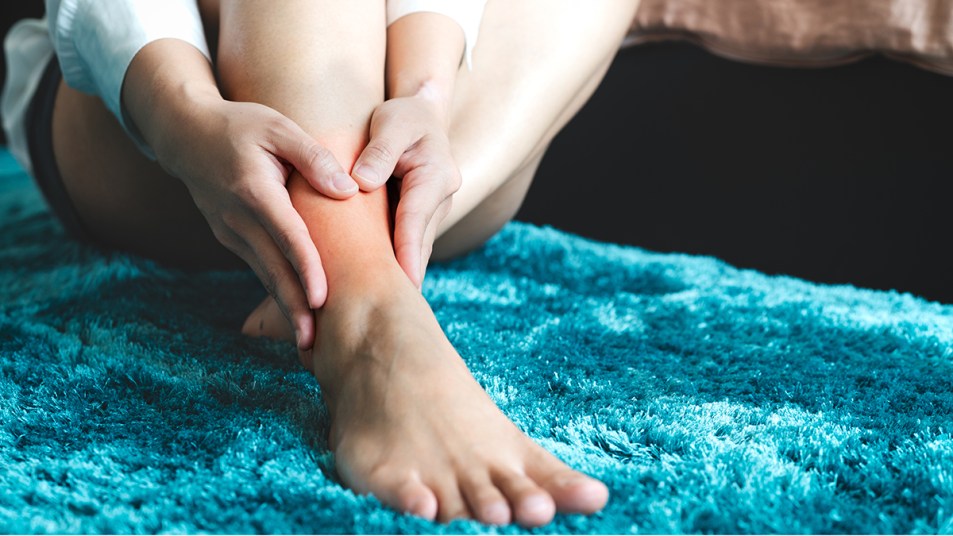
Swollen ankles are a surprisingly common occurrence for women — especially as we get older. They often occur on a hot day or after standing for hours or eating your favorite salty snack. And this symptom can be more than just an eyesore. Swollen ankles, or “cankles,” can also cause discomfort and, in some cases, they indicate a more serious problem. To help you tackle this problem, we turned to top doctors to explain the causes of swollen ankles and included a range of female ankle swelling pictures. We also asked them for the best natural remedies and DIY tricks to outsmart the problem, and they certainly delivered!
Ankle swelling, or edema, refers to an abnormal balance of fluids and an accumulation within the intracellular spaces occurring between the cells, explains Josie Conte, DO, an osteopathic physician specializing in family medicine and part of the Maine Dartmouth Family Medicine Residency. And it’s actually more common than you might think. In fact, nearly 20% of people over age 50 experience edema, with more women than men dealing with this uncomfortable condition.
Common causes of swollen ankles
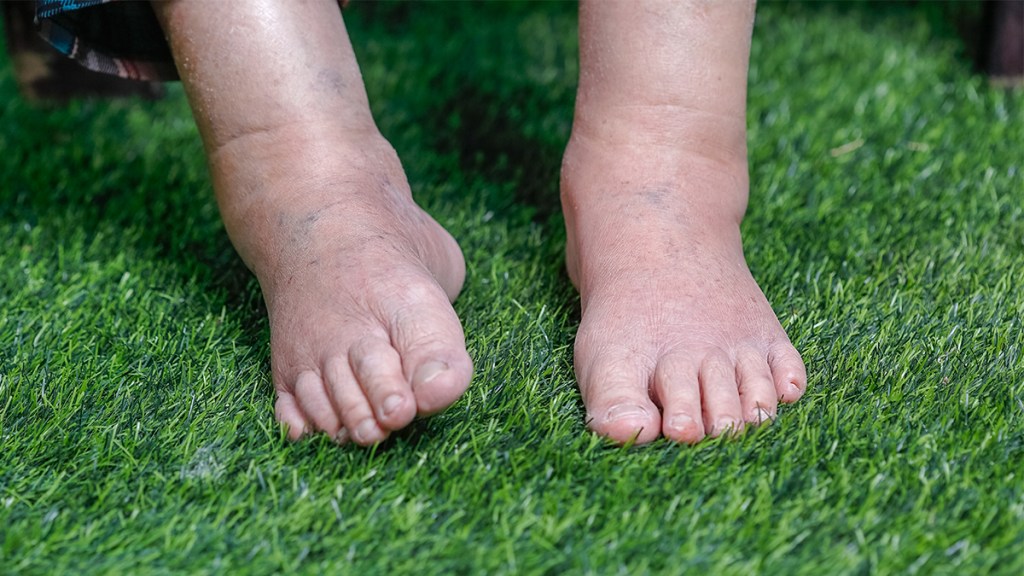
“Swelling of the ankles or feet is most commonly due to a lack of blood returning to the heart, leading to fluid buildup in the tissues,” says Sonia Rivera-Martinez, DO, a board-certified family medicine physician.
Eating too much salty food, standing or sitting in the same position for a prolonged period, premenstrual syndrome, drinking alcohol and hot weather are some of the more common nonserious causes of swollen ankles that often respond well to home remedies.
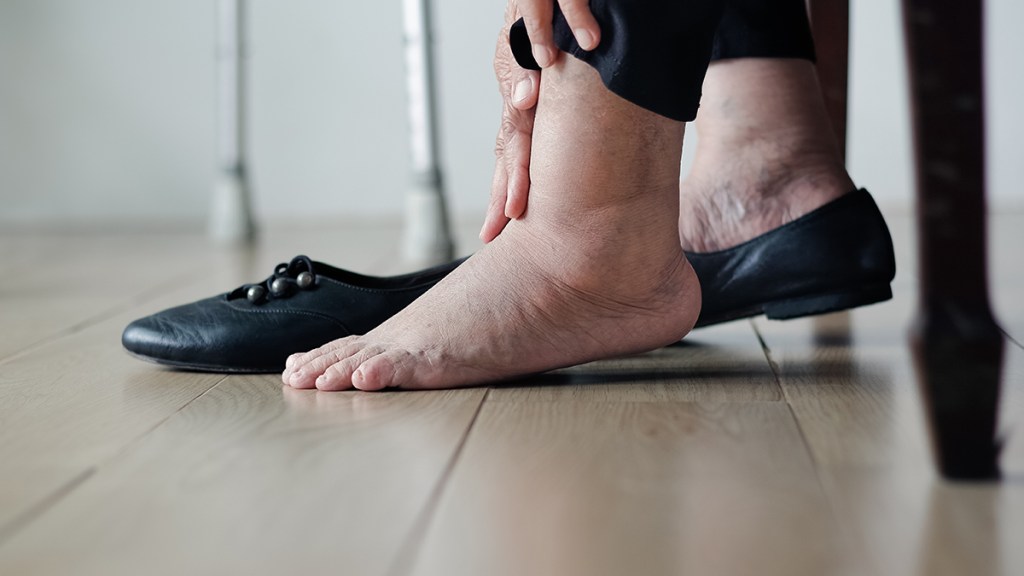
While not an exhaustive list, Dr. Rivera-Martinez says some of the more common non-emergency, medical-related reasons women experience swollen ankles include:
- Pregnancy: Some ankle swelling is common and considered normal during pregnancy. However, if the swelling is sudden or excessive, it may be a sign of preeclampsia, a serious condition requiring prompt medical attention.
- Medications: Side effects from certain medicines may cause ankle swelling. Dr. Rivera-Martinez says medications to watch include contraceptive pills, steroids, antidepressants, hormone therapy and blood pressure medications.
- Injury: A sprained ankle, of course, can lead to swelling.
- Cellulitis: An infection of the skin can cause swelling of the ankles that spreads rapidly. Cellulitis is often associated with redness and warm skin at the affected site.
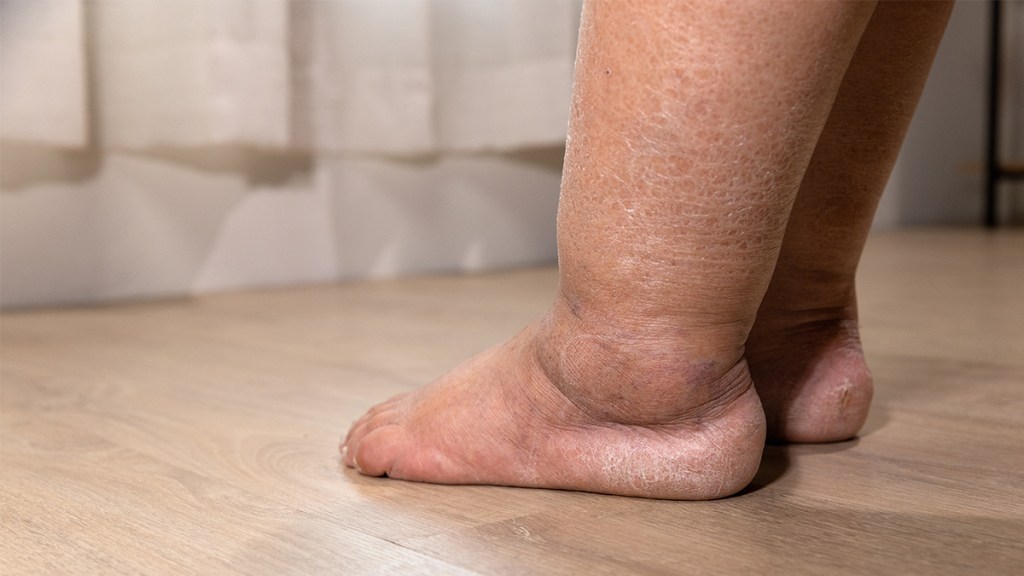
How to reduce ankle swelling not due to an injury
The good news is that if your swelling isn’t caused by any of the factors above, it’s easy to bring down the swelling at home — often in less than 24 hours, says Florence Comite, MD, an innovator in Precision Medicine, with multiple specialties in endocrinology. Read on for the doctor-recommended home remedies.
Strike a pose
Dr. Conte recommends an easy yoga pose called Viparita Karani, or legs-up-the wall, a position that improves circulation, says functional medicine physician Michelle Thompson, MD, founder of Epoche Medical in Coral Springs, Florida.
How to do the legs-up-the wall pose:
- Place a folded blanket, yoga mat or cushion on the floor about four to six inches from the wall.
- Start by sitting with your left side against the wall, knees bent.
- Roll on to your back and stretch your legs up the wall. Your buttocks will hang slightly off the blanket or mat and should be a few inches from the wall when the back of your legs are resting against the wall.
- Rest your arms at your sides, palms facing up, and look toward the ceiling.
- Stay in this pose and breathe slowly and deeply for up to 10 minutes.
Note: If you can’t straighten your legs against the wall, bend your knees as much as you like, and if it creates comfort, you can even place a pillow between your knees and the wall.
Click through to see the pose in action, as demonstrated by Yoga with Adriene
Pump your legs
If you’ve been standing or sitting too long and are retaining fluid in your lower legs and ankles, Dr. Comite, founder of the Comite Center for Precision Medicine & Health, recommends flexing your feet or pumping your legs to redistribute the fluid. To do: Start seated or standing and holding onto something for safety, then rise up on your toes and lower yourself gently a number of times.
Soak your feet
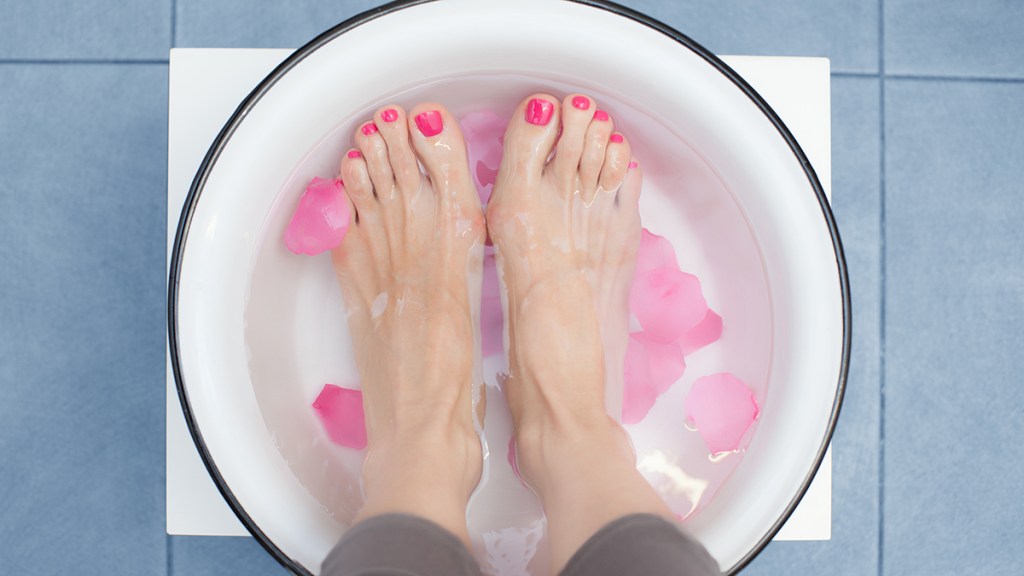
Soaking your feet in alternating warm and cool baths will relax, then constrict your blood vessels, which helps to pump lymph fluid and improve circulation, explains Dr. Conte. (Click through to learn how keeping lymph fluid moving can help you lose weight.) Simply fill two basins, one with warm water and the second with cool. Soak your feet in each basin for up to 10 minutes, ending with your feet in the cool water. She also recommends adding a cup of magnesium-rich Epsom salts, which have been shown to ease swelling. (Click through to learn more about baking soda foot soaks and how they can help heal calluses.)
Watch your sodium intake
“Sodium attracts and holds water in the body, so when we consume more sodium, more water is stored in the body to counteract and balance the increased sodium levels, which leads to fluid retention and swelling,” says Dr. Comite. Her tip? Try to avoid adding extra salt after the food is cooked and instead, consider alternative spices or Himalayan (pink) salt, which has less sodium and more minerals. (Click through to our sister site to discover how green salt can help you cut back on sodium.)
Try a DIY massage
Dr. Conte says a simple self-massage can help reduce swelling in the ankles. (Click through to see how one woman used a similar DIY massage to shrink her swollen ankles.) Here, Dr. Conte’s easy how-to:
- Pour 1 tablespoon of organic sunflower, sesame or grapeseed oil into a small glass jar with a lid.
- Add 6 drops total of one or two essential oils (she likes cypress, juniper berry, geranium, mandarin, sweet orange and rosemary essential oil, all of which she says can help improve circulation, and shake well. (Click through to see how essential oils can improve focus, memory, sleep and more!)
- Apply a small amount of the oil to your hips and use your hands to gently massage your thighs, behind your knees, calves, ankles and feet.
- Finish with long strokes from the feet upward.
- Rest with your feet elevated on a pillow.
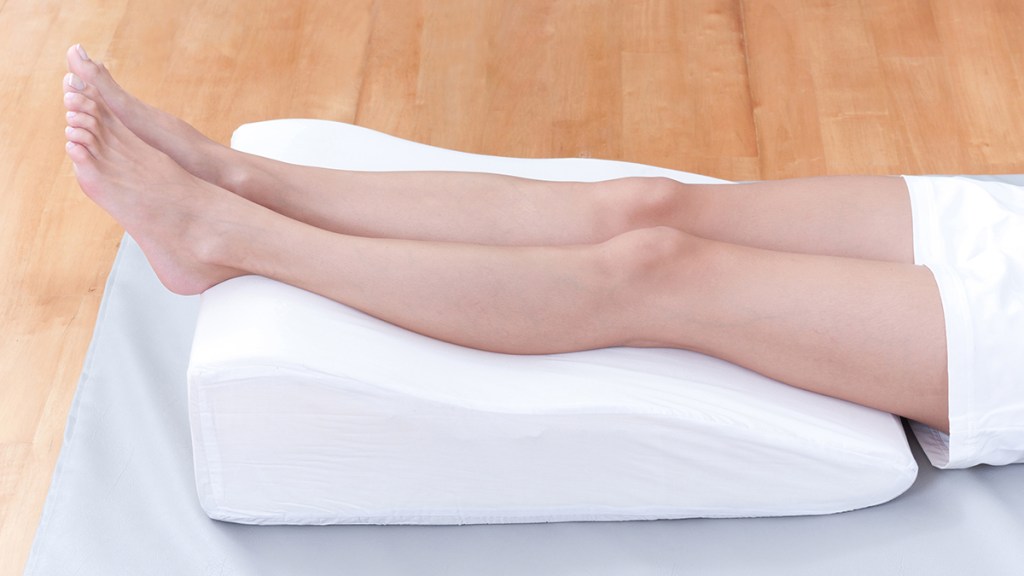
Consider compression socks
Compression socks work by applying graduated pressure to the legs and feet to prevent fluid from pooling. The pressure is most intense at the ankles and decreases going up the leg, says Dr. Comite. “This gradient promotes the upward flow of blood, counteracting the effects of gravity that allows blood to pool in the lower extremities.” Bonus: Wearing compression socks also reduces snoring by 36%, according to research in the journal Respiratory Physiology & Neurobiology. Dr. Comite says to consider compression leggings when traveling by airplane or car for longer distances and to stand up every hour to move around and flex your legs to improve circulation. Don’t own compression socks? This inexpensive pair has more than 82,000 glowing reviews! (Buy on Amazon, starting at $18.66)
How to reduce swollen ankles due to an injury
Different at-home strategies work best for swelling caused by injury. Here, our doctors’ top remedies:
Freeze out swelling
Cold packs and ice allow blood vessels to constrict. “This narrowing helps reduce blood flow to the area, which decreases the amount of fluid and inflammatory substances reaching the tissues around the ankle,” explains Dr. Comite. Cold packs work well for injuries, she says, especially sprained ankles, and can effectively reduce swelling in 24 hours.
Dr. Comite’s easy how-to: Keep your foot or feet in a pail filled with ice for as long as tolerable, usually about 20 minutes, rest for 5 to 15 minutes, then repeat. Use an ace bandage to wrap the affected ankle if standing or walking is necessary.
Try RICE
If you’ve sprained or twisted your ankle, follow the RICE method of Rest, Ice, Compression and Elevation, explains Dr. Comite. “Swelling generally retreats within 24 to 48 hours depending on the severity of the sprain and how effectively ice is applied,” she adds. And Heather Moday, MD, director of the Moday Center in Philadelphia, advises pointing and flexing your feet while they’re elevated. Not only does this help improve circulation, but it also improves mobility in your feet and ankles, she says.
When you should see a doctor about swollen ankles
Ankle swelling that occurs with other symptoms like shortness of breath, facial swelling, lips swelling, or wheezing or tightness in your throat could mean something more serious is happening and you should see a doctor, explains Dr. Conte. You should also see a doctor if the swelling is very sudden and only in one leg. “This is especially important if there is redness and/or pain,” she adds. A doctor must evaluate if it’s a blood clot.
Some potentially serious causes of swollen ankles:
- Blood clots: Blood clots may form in the deep veins of the legs, causing swelling, most commonly in one leg. This is a serious condition as a clot in a leg can travel in the blood to the lungs and cause a pulmonary embolism. If there is swelling in one leg accompanied by pain and low-grade fever, Dr. Rivera-Martinez says you should be promptly evaluated by a medical professional.
- Heart failure: When the heart is not pumping blood efficiently due to heart failure, you may experience pooling of the blood in the legs, resulting in swollen ankles, feet and legs.
- Kidney disease: This condition can interfere with the kidney’s ability to remove excess fluid from the body, leading to fluid accumulation in the tissues.
- Venous insufficiency: A medical condition in which the one-way valves within the veins that customarily move blood towards the heart are damaged, allowing blood to leak back and be collected in the tissues.
Dr. Rivera-Martinez recommends that you make an appointment with your doctor if any of the following are present along with swollen ankles:
- Swollen skin appears stretched, shiny or the skin leaves an indentation after being pressed
- Chest pain
- Heartbeat is irregular
- Shortness of breath
- Swelling has not improved after a few days of treatment at home
- Swelling worsens or becomes painful
- Swollen area is red or feels warm/hot to your touch
- You have a high fever or feel hot and have chills
If you have any of the above symptoms contact your doctor or head to an urgent care center for evaluation.
Click through to read how one woman cured her swollen ankles:
The $10 Cure That Got Rid Of One Woman’s Cankles and Shrunk Her Swollen Legs
This content is not a substitute for professional medical advice or diagnosis. Always consult your physician before pursuing any treatment plan.













